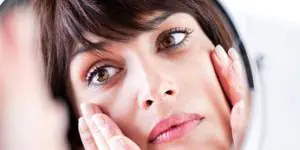
Facial edema is a violation of water metabolism when excess fluid accumulates in the intercellular space of soft tissues. Swelling can be subtle and pronounced. It can be distributed evenly or in one zone. This is not a disease, but a symptom of a pathological process or disease. Swelling can develop temporarily in healthy people.
Causes of facial swelling in the morning
The reasons may be different, you need to figure out the source of the problem. A dangerous situation is the accumulation of fluid as a symptom of the disease; the clinical picture in each individual case will have its own characteristics. The defect can form from the following disorders:
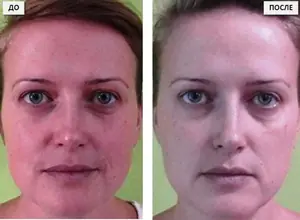
An allergy can cause fluid retention, it will be accompanied by a rash, itching, the skin will become red and may become blotchy. During this period, breathing difficulties are possible - Quincke's edema.- During pregnancy, edema occurs naturally - due to increased progesterone, the mucous membranes of the nose and labia swell. In pathological conditions, edema is a symptom of gestosis - late toxicosis.
- Inflammatory process in the nasal cavity (sinusitis), tonsils - the outflow of fluid accumulates in the lymph nodes of the jaw area and leads to the development of edema.
- Diseases of the heart and blood vessels. If the functioning of the heart muscle is disrupted, the face becomes swollen and flabby, the skin thickens and does not move when touched. The problem develops in the evening, along with shortness of breath and heaviness. Vascular diseases can be identified by a swollen, bluish face.
- Tumors in the neck and face.
- In case of kidney diseases, swelling forms to a greater extent under the eyes. The problem becomes obvious in the morning, the face begins to enlarge, then the eyelids become very swollen. The shade of the skin becomes yellowish, the formed edema becomes watery and mobile. In the stage of a chronic disease, a person experiences an increase in body weight due to internal edema.

Osteochondrosis of the cervical spine causes swelling of the eyelids and cheeks. Visual and hearing acuity is impaired, and there is an unpleasant sensation as if the head is filled with fluid.- From a sunburn, swelling will be located in the forehead, nose and eyes.
- A specific reaction to blood transfusion may occur.
- Any injury after a blow to the face has swelling; this is a normal reaction of the body when blood vessels and tissues are damaged.
- Thrombosis of the superior vena cava causes problems with blood flow in the upper part of the body, causing the face to appear bluish.
- Endocrine diseases have a symptom of severe skin swelling of the face.
Another reason for facial swelling in the morning may be caused by water retention in the body. When excess fluid is poorly removed from the body, it accumulates, which leads to swelling in the morning. This often occurs due to protein loss or the inability of physiological solutions to penetrate into the cell.
Fluid retention

It could be dehydration. When individual cells accumulate fluid and, after saturation, the lipid defense becomes clogged, moisture cannot penetrate the cell and tissue edema occurs.
Water in the body is retained from the accumulation of toxic substances. The body tries to retain waterto further dissolve accumulated poisons. Such swelling is observed during alcohol and drug intoxication.
The reasons why the face swells in the morning may be hidden in the use of diet, unbalanced nutrition or prolonged fasting. Get rid of excess water a special preventative diet will help the body, consisting of eating fresh foods containing vitamins and minerals.
Swelling of the face and eyes may appear due to constant weight gain, and even fasting will not be able to remove extra pounds.
The most common reasons

Drinking a large amount of liquid at night is also a reason; here the body simply cannot cope with its elimination. Most often, such problems arise among lovers of spicy, salty foods and those on diets. They try to wash down their hunger with water.
Swelling of the face in the morning can be caused by long hours of work at the computer and eye strain.
A pregnant woman has reserves excess solutions accumulate in the body - this is a protective reaction of the body to prevent toxic poisoning from occurring. To avoid swelling, you must adhere to a healthy diet and lifestyle.
Sleepless nights with wild fun and drinking alcohol will definitely cause swelling. But such manifestations will disappear on their own after two hours after waking up.
If problems with fluid accumulation become chronic, you should see a doctor for evaluation. Get rid of the problem in this situation is possible only after identifying the disease and treatment. What to do if your face is swollen in the morning? There are methods to relieve swelling:

diuretics;- antihistamines;
- decoction of bay leaf or dandelion root;
- gels that relieve swelling;
- refusal to consume salt, canned food, smoked meats, carbonated drinks, coffee, alcohol and other harmful products for this period;
- regularly drinking two liters of water per day;
- exclusion of food and liquid intake before bedtime;
- inclusion of fiber-rich foods;
- kidney cleansing at home;
- rubbing the skin with pieces of ice or cold compresses;
- decongestant masks;
- washing with decoctions of medicinal plants;
- using a high pillow for sleeping, which ensures the outflow of fluid from the face.
There are many different means of getting rid of edema. It all depends on the cause of fluid retention in the body. In case of regular and prolonged swelling of the face, which is difficult to remove, it is necessary to consult a specialist and check the internal organs and systems. If any disease is detected, the doctor will prescribe a course of treatment, after which the body’s functions will be restored and the problem will disappear.

Content:
What is facial swelling
If your face swells in the morning, but it goes away after a short time, there is no serious cause for concern. This may be a result of pressure on your face while sleeping if you like to sleep with your face in your pillow. But if not, then first you need to understand the physiology of this unpleasant phenomenon.
Edema is an increase or stretching of tissue due to the accumulation of fluid or inflammation. It can occur anywhere on the face, but is most common on the lips, cheeks and eyelids, and can also spread to the neck area.
During sleep, fluid is redistributed. Usually most of it is concentrated in the lower half of the body, pulled down by gravity. But in a lying position, it is evenly distributed throughout the body, which is the most common cause of facial swelling in women in the morning. The effect disappears an hour after it occurs.
Orbiting astronauts have a perpetually swollen face due to the lack of gravity pulling fluids toward their legs while they are “hanging.” As a result, while in space, they lose most of the wrinkles on their faces.
Other physiological causes include:
- Water retention: The most common cause of this problem is fluid retention. The best way to avoid this is to limit your alcohol and salt (sodium) intake and, as counterintuitive as it may sound, drink more water (throughout the day) to flush your system.
- Allergic reactions. Another common cause of puffiness in the morning is an allergic reaction. Check for possible allergens, including allergies to the feathers in the pillow or the material of the pillowcase, by replacing them for a few days.
- Lotions and creams: It is also common for sensitive skin to react to lotions or creams applied to the face before bed. Stop using all products for a few days to see if the swelling goes away. Steroid creams are especially likely to cause swelling.
- Cushion height: Sometimes swelling is caused by the level of the pillow during sleep, which causes either pressure or water retention. Try to sleep with two pillows so that the fluid drains properly and does not settle in the head and neck area. If it hurts or causes discomfort, try an orthopedic pillow.

More about the reasons
Fortunately, the most common causes do not require specialized treatment and are our body’s reaction to certain factors, by eliminating which we will get rid of swelling. And in some cases, swelling goes away without any intervention. The most common of these reasons include:
Allergy
Dust, animal hair, plant pollen - all this endlessly swirls in the air and can lead to an allergic reaction. In addition to the usual sneezing and watery eyes, allergens can also lead to so-called facial allergies. Symptoms include puffy eyes, flaking skin, swelling and chapped lips from mouth breathing.
Sinusitis
Sinusitis is inflammation and swelling of the sinuses, which become blocked and filled with fluid during a cold. As a result, pressure develops in this area, accompanied by a dull ache around the eyes, greenish-yellow nasal discharge, severe headaches and swelling of the face.
Focus on rest, drink plenty of fluids and take an antihistamine and everything will go away on its own.
Abscessed tooth
An abscess (aka infection) causes pus to accumulate and become swollen around the tooth or gums. Accompanied by toothache and swelling of the face in the area of the diseased tooth.
At home, an abscess is treated with compresses and anti-inflammatory drugs. However, you should consider seeing a dentist as the abscess will need to be drained and oral antibiotics will also need to be taken.
Subsequent treatment will eliminate both the toothache and the swollen cheek.
Hot shower
There's nothing more relaxing than standing in a steamy shower. But too hot water is actually not that good, and after such a shower you may find that your face (and not only) has increased in size. Hot water steams and relaxes the skin and muscles.
Too much drinking
We all know that drinking too much alcohol dehydrates the body, which is what makes hangovers so bad. But dehydration in turn leads to fluid retention, and the next morning you will wake up not only with a sore head, but also with a swollen face.

Too much salty
If you spend the evening lying in bed with a large bag of chips, you may wake up the next morning with severe swelling. Excessive salt content can cause the body to retain more fluid in an attempt to dilute the salt, causing the face to appear more puffy than usual.
PMS (premenstrual syndrome) sometimes causes fluid retention in the body, which, as we know, can also lead to swelling.
Allergy to pillows
Blankets and pillows are another cause of morning swelling. Feather pillows or a duvet can be a real allergen, especially for women. Agree, it’s not pleasant to wake up in the morning with a swollen face, even if you really love your bedding.
Sunburn
Yes, it is possible to get a sunburn even if you don't feel it. And this can cause not only redness, but also swelling in some cases. For this reason, it is necessary to use sunscreen daily.
Barley
This is a painful inflammation on the edge of the eyelid. It can be external or internal, and can often cause swelling of the area around the eyes. You can treat the sore spot with chloromycetin, but after a maximum of 7 days it will break through and the swelling will go away.
Reactions to medications
Facial swelling may occur as an allergic reaction to certain medications, such as penicillin or aspirin. If you suspect an allergic reaction, you should consult your doctor as soon as possible about allergy injections or oral antihistamines.
If your face swells and does not go away
But why does the face swell and the swelling does not subside? If the swollen face continues to increase and causes severe pain, or if it is accompanied by other symptoms, you should see a doctor immediately, as it may be a symptom of a more serious condition:
Angioedema
Angioedema is an excessive accumulation of body fluids in the skin, caused in many cases by an allergic reaction. As a rule, it occurs together with urticaria. The most common locations are around the eyes, lips and face, but it can also appear in other parts of the body, and even in the throat. In particularly difficult cases, immediate treatment with adrenaline is required.
Angioedema can be caused by an allergic reaction to:
Dermatomyositis
Dermatomyositis is an autoimmune disease in which the skin and skeletal muscles are infiltrated predominantly by lymphocytes. Although it is an idiopathic disease, it may result from an interaction between the patient's genetic background (determining the immune system response) and the viral pathogen. One of the symptoms is bilateral facial swelling.
Malnutrition (severe) or obesity
In both cases, facial swelling is a disruption of body functions.
Skin infections
A bacterial skin infection causes the face or other area of the body to swell and become inflamed, red, and hot to the touch. If you experience these symptoms—and especially if the swelling spreads—go to the emergency room. With timely treatment, only a week's course of antibiotics is needed, but without treatment, deaths are common.
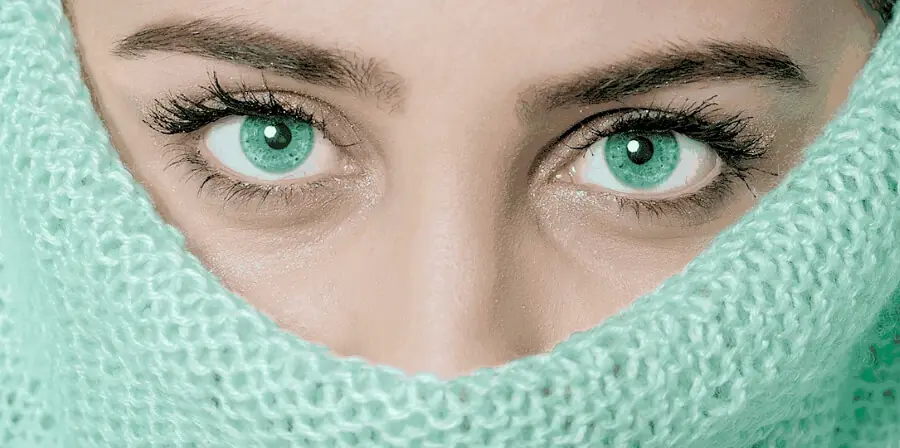
Piggy
Other symptoms in addition to a puffy scalp include headache, fever, and muscle pain. Most cases resolve within a few weeks as the illness subsides.
Thyroid
The thyroid gland produces a hormone that regulates metabolism and body temperature. If for some reason not enough hormones are produced, metabolic changes can lead to enlargement of the subcutaneous tissue.
Symptoms that accompany this condition include increased feeling of cold, weakness, dry skin and irregular menstruation.
Conjunctivitis
If the swelling is concentrated around the eye area, it's likely conjunctivitis, a nasty infection or inflammation of the membrane lining the eyelids.
Most causes of conjunctivitis are related to viruses, but there are also cases of allergies. In addition, there are also bacterial conjunctivitis or even caused by contact lenses. In addition to swelling, there may be redness, watery eyes, or itching. Viral conjunctivitis is usually treated with supportive care, which includes cool compresses. Bacterial conjunctivitis requires antibiotic eye drops.
Rosacea
If you have rosacea, certain triggers can cause a flare-up. Hot weather, spicy foods, alcohol, and even emotional stress can lead to facial flushing, burning, and even swelling.
A gentle cleanser and moisturizer and daily use of sunscreen will help control symptoms.
Are you taking steroids?
A puffy face may be the result of taking prescribed steroids—and higher doses may lead to more significant side effects. In this case, you should discuss with your doctor the possibility of reducing the dose.
Cushing's syndrome
Yes, cortisol is a stress hormone, but it also helps regulate blood pressure, blood sugar and a variety of other processes. But when too much of it is pumped out by the adrenal glands, it can lead to Cushing's syndrome, a disease characterized by a round, puffy face, easily vulnerable skin, and increased body hair.
Cushing's disease affects women nearly three times more often than men and often occurs in people who have been treated with glucocorticoids.
If left untreated, Cushing's syndrome can lead to heart attack, stroke, and type 2 diabetes.
Lung cancer causes swelling of the face and neck when the cancer presses on a vein that runs from the head to the heart. This symptom is called superior vena cava syndrome or superior vena cava obstruction.
The superior vena cava is a vein that carries blood from the head and arms to the heart and runs near the top of the right lung and the lymph nodes in the chest cavity. Tumors in or around the lungs or lymph nodes can block normal blood flow, leading to obstruction.
Besides lung cancer, other cancers that lead to superior vena cava obstruction include:
- mammary cancer,
- lymphoma,
- thyroid cancer,
- thymus tumor.
This condition can also be caused by other non-cancerous diseases:
- tuberculosis,
- inflammation of the vein (thrombophlebitis),
- fungal infection such as histoplasmosis,
- aortic aneurysm (swelling of the main artery that carries blood from the heart to the body),
- blood clots in the superior vena cava,
- enlargement of the thyroid gland,
- constrictive pericarditis (inflammation of the membrane surrounding the heart),
- side effect of radiation therapy in the chest cavity.
Symptoms of superior vena cava obstruction may develop quickly or gradually. Early symptoms include swelling around the eyes or face, especially in the morning. Common symptoms of superior vena cava obstruction include shortness of breath and swelling of the face, neck, arms, or torso. Sometimes, superior vena cava obstruction can also cause dizziness, visual disturbances, fainting, and redness of the face, palms, or mucous membranes. The condition requires immediate medical attention.
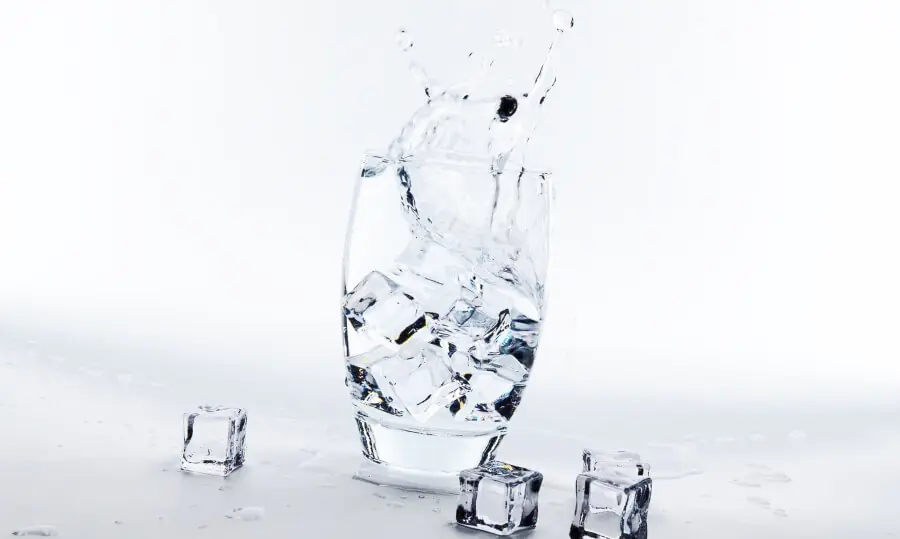
What to do
What to do? If swelling is not a symptom of the disease and, as a rule, goes away after half an hour, you can start following simple rules that will give excellent results in a very short time:
- The idea that drinking water can lead to a bloated face is a myth. In fact, everything is exactly the opposite - insufficient water consumption can lead to swelling of the face. Dehydration causes blood vessels to dilate, which in turn promotes water retention, especially in the facial area.
High salt content in the body retains water, which also causes swelling. Avoid carbonated drinks and always monitor the salt levels in your food.
Never underestimate the power of a good massage to help de-puff your face. Lubricate your face with moisturizing or massage oil and massage lightly. This process will help push excess fluid to the lymph nodes in the neck.
The first and main rule is do not drink anything after 9 pm. If you feel very thirsty, suck on ice or take a couple of sips of kefir. The fact is that the liquid you drink before going to bed manifests itself in the form of swelling on the face in the morning.
Moisturizing face masks bring tangible benefits to health and appearance, leaving the skin soft and velvety. But never make such masks at night. Excessive skin hydration can cause swelling.
Do swelling on your face appear every morning? Take diuretics. If you choose store-bought ones, first consult your doctor, as these drugs have contraindications. But you can use natural products that remove fluid from the body well. These include: watermelons, green tea, cucumbers. These products will not only rid you of excess fluid in the body, but will also cleanse it of toxins and waste.
Pay attention to the patches - overlays for the area under the eyes, soaked in special useful products. Choose a decongestant option. Such devices have a lymphatic drainage effect and can relieve you of swelling for a long time.
Stop drinking coffee or reduce the amount you drink to a minimum. The fact is that this invigorating and, for many, tasty drink removes a special fluid from the body, which maintains the normal balance of moisture in the body. Replace coffee with green tea; this drink is also unusually aromatic and has a unique pleasant taste. And, of course, never drink coffee before bed.
To always look charming, drink as much water as your body requires. You don’t need to endure thirst, but you shouldn’t pour excess liquid into yourself either. Listen to the desires of your body, take care of your health, eat natural and healthy foods, and your beauty will be perfect.
Prevention
Despite the fact that the causes of swelling are different and the methods for treating them are also different, preventive measures in many cases are the same:
- Physical activity helps to “squeeze” excess fluid out of the body.
- Include healthy “anti-edematous” foods in your diet: apples, cottage cheese, tea with lemon; In case of food allergies, you need to follow a diet.
- Limit your salt intake.
- To avoid facial swelling, it is recommended to sleep on your back: sleeping on your stomach often leads to baggy lower eyelids.
Have you been waking up more and more often lately with a swollen and bruised face? There can be many reasons for this - from simple lack of sleep to serious diseases of the cardiovascular system. But why the face and not the arms or legs? The fact is that the subcutaneous tissue on the face has the most loose structure, especially the upper and lower eyelids. Therefore, excess fluid that accumulates in the body successfully settles there. If the swelling goes away by lunchtime, you're probably just tired or ate too much salty food at night. If swelling haunts you throughout the day, most likely, some processes in the body are disrupted. In this case, cosmetic masks are not enough; you need to see a doctor as soon as possible.
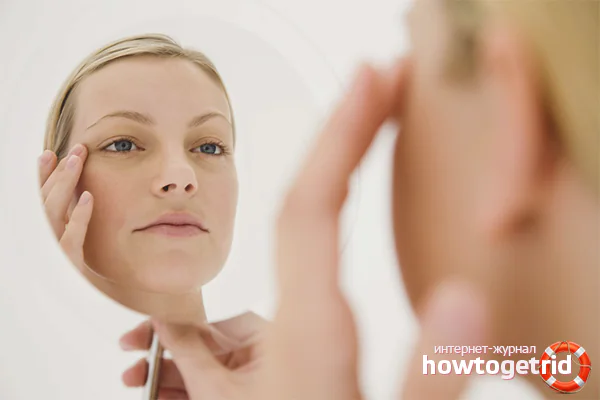
Causes of morning puffiness
Puffy eyelids and bags under the eyes can be observed in almost every person in the morning. But what does this mean? Here are the main factors that can cause facial swelling in the morning.
Excessive water consumption
Very often we wake up with a swollen face if we drink a huge amount of any liquid at night. Especially if it was beer. The composition of alcohol implies leaching of salts and deterioration of kidney function. In addition, beer is a drink that is usually drunk a lot, at least half a liter per person. The swelling is enhanced by the fact that the feast is usually held in the evening, and the kidneys simply do not have time to process such an amount of fluid. It is noteworthy that in winter the swelling is more pronounced, since in the summer some of the fluid is excreted along with sweat.
Another example of hormonal swelling is the menstrual cycle. Girls who very strictly and scrupulously monitor their weight note that it increases before menstruation. Where from, if there were no violations in the diet and training? The fact is that before menstrual bleeding, the body collects fluid. This causes slight swelling of the face and eyes before menstruation and in the first days of its occurrence.
Salt
Everyone knows that salt retains water. Salt particles in the body attract water; each gram of salt attracts about 100 grams of liquid. Just imagine how much you ate and you will understand why your face became like a balloon and your eyes narrowed to slits. Normally, a person should consume 2-3 grams of salt per day. If this number exceeds 5 grams, edema cannot be avoided. Especially if salty foods were eaten at night. This is also aggravated by the fact that after eating salted fish you want to drink a lot. This results in a double load on the kidneys - salt and a large amount of liquid.
Kidneys
A common cause of facial swelling is various disorders of the kidneys. This could be urolithiasis, pyelonephritis, renal failure, etc. Especially if the swelling is quite serious and does not go away until the evening. In this case, you should definitely consult a doctor (urologist).
Heart
Heart disease is another very serious and common cause of puffiness. More often, facial swelling occurs due to heart failure. Due to disturbances in the exchange of sodium ions in the body, a huge amount of fluid is retained in the intercellular space. However, cardiac edema has some peculiarities. Unlike kidney ones, they appear in the late afternoon. In addition, the skin with cardiac edema is a little cold, but with renal edema it is warm. Swelling due to cardiac dysfunction is accompanied by shortness of breath and high blood pressure.
Lack of sleep
Banal overexertion can cause swelling of the face. If a person works hard, he does not have time for proper rest, he sleeps little, this leads to regular swelling on the face and bags under the eyes. This is especially true for “night owls” - people who prefer to work at night. In this case, a simple day off will help correct the situation, which you need to spend in bed - sleep as much as you want.
Incorrect posture while sleeping
Some people like to sleep on their stomach, hugging a pillow. As a reward for this, they get a rumpled face with folds in the skin in the morning. But why does swelling appear? If you sleep on a pillow that is too high and hard, your head is positioned unnaturally and important lymphatic drainages in the neck area are pinched. This leads to stagnation of fluid in the head and face area. As a rule, such swelling goes away within an hour after waking up.
Allergy
Sometimes swelling on the face can be the result of a simple allergic reaction. It is usually accompanied by watery eyes, sneezing, coughing, runny nose, and the skin in swollen areas may itch. If swelling appears in the morning, perhaps you are having a reaction to the pillow filling? This often happens if pillows are made of natural materials - swan's down, buckwheat husk, etc. Poor-quality cosmetics can also lead to swelling of the eyelids and face, especially if you do not remove your makeup before going to bed.
Diseases of the ENT organs
If the swelling is localized more on one side of the face and not only the eyelids, but also the wings of the nose are swollen, this is most likely due to inflammatory processes in the maxillary sinuses. Stagnation of mucus and pus in the sinuses leads to retention of lymphoid fluid.
Tears
If you cried the day before because of a quarrel or heartbreaking melodrama, do not be surprised that in the morning you will find swelling on your face.
In addition to these main reasons, the face may swell due to a pulled out or diseased tooth, various operations in the facial area, or blood transfusion. The skin may be swollen after sunbathing and due to a lack of B vitamins. Here are some tips to help you get rid of morning puffiness.
How to get rid of morning puffiness of the face
The first step is to find out the reason why your face began to swell. Try to analyze this phenomenon - did it arise only today or do you observe the picture every day? If you drank alcohol the day before, ate chips and salty crackers, there is nothing to be surprised about; the swelling will go away by lunchtime. In the future, try to drink less and limit your salt intake. Remember that a huge amount of salt is contained in prepared foods - ketchup, mayonnaise, cheese, etc. It is very important not to drink too much, as is advised in all diets and healthy eating rules. Drinking water by force will not give you any benefit (unless you are sick). You need to consume approximately 30-35 grams of liquid per kilogram of a person’s weight per day. In summer, naturally, more. If you are constantly thirsty, perhaps this is a symptom of diabetes?
If swelling occurs due to upcoming menstruation, you just need to get through this time. During pregnancy, you should monitor the amount of salt you consume, keep your feet elevated more often, walk more, and also have your urine tested regularly to monitor your kidney function.
Be sure to get enough sleep, follow a daily routine, and take rest breaks. Reduce your coffee consumption and replace it with green tea. If the cause of swelling is an allergy, you need to identify the provoking factor - get tested for allergy tests. Choose high-quality cosmetics and be sure to remove makeup before going to bed using professional products - lotions, milk, tonics, etc. To get a good night's sleep, you need to buy a quality mattress and pillows.
If swelling does not go away, you can drink decoctions of diuretic herbs. Drink a decoction of rose hips and lingonberry leaves - the resulting drink will not only remove excess liquid, but will also delight you with its taste. Herbs such as chamomile, oregano, clover, nettle, and bear's ear have diuretic properties. A decoction of bay leaf and dandelion root helps very well. You need to add pure dandelion root and a few bay leaves to the jar. Pour boiling water over and leave for 3 hours. Drink a liter of decoction during the day. Within a week of this treatment, the swelling will disappear completely.
If you need to quickly tidy yourself up and get rid of puffiness as soon as possible, use ice. Wipe your face with it and after a few seconds the swelling will disappear. For regular swelling, you can massage the eyelid area with your fingertips using a light cream. This will improve fluid circulation in the tissues. In addition, various cosmetic masks against puffiness will help - cucumber, parsley, raw potatoes, kefir. You can lubricate the bags under the eyes with ointments such as Troxevasin, Lyoton, Dalobene. They improve fluid circulation and relieve swelling. You can also take an antihistamine tablet - Zodak or Suprastin will help improve the condition of your face.
If all these measures do not help get rid of facial swelling, and the swelling only increases, you should definitely consult a doctor. Kidney and heart diseases cannot wait long. The sooner you diagnose the disease and begin treatment, the greater the chance of a quick and painless recovery. Take care of your body, as they say, “it’s better to be too safe than too safe”!
Video: how to remove facial swelling



